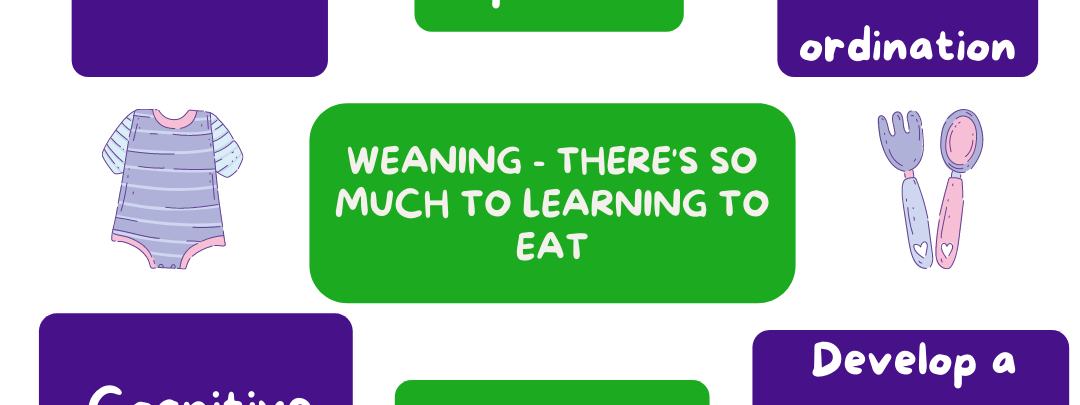Weaning is such an exciting milestone for you and your baby but it can also be a confusing one and with so much conflicting advice out there it is difficult to know which advice to follow. So here I am going to debunk some of the common weaning myths to get you started
Myth 1 : My mum weaned me at 3 months so it must be fine for me to do the same
Nope…advice has changed over the years and it is currently thought best for babies to start weaning at around 6 months, however all babies are different and so look out for the developmental signs of readiness. The signs of readiness are: (1) can stay supported in a sitting position and hold head steady, 2) can look at food and put it into their mouth all by themselves and 3) can swallow food so more is swallowed than pushed back out. All experts agree to never give solids before 17 weeks. Plus babies are generally not ready for finger foods until 6 months and so babyled weaning is not really suitable until this time.
Myth 2: My baby is ready for weaning because he/she is waking in the night after a period of sleeping through
No…Starting solids won’t make a baby more likely to sleep through the night and extra milk feeds are usually enough until a baby is showing the developmental signs of readiness. Besides the small amount of solid foods that babies consume at the start of weaning don’t contain a lot of calories.
Myth 3: Food is only for fun under 1
No again!….Learning to eat is important for many different reasons and although we want all our children to love food and of course for weaning to be fun it is important to understand these reasons.
Weaning is important for nutrition sources in addition to usual milk feeds. A baby is born with stores of iron and by 6 months these stores are depleted. Breast milk or infant formula will provide enough iron for the first 6 months of life but after this weaning foods should include iron-rich sources such as red meat, oily fish, eggs, ground nuts and nut butters, lentils and pulses. Also biting and chewing helps with the development of muscles needed for speech and handling finger foods and spoons helps with the development of motor skills and coordination. So there is so much more to learning to eat than that meets the eye!
Myth 4: I should delay giving peanut products to my baby
Wrong!….Deliberately delaying giving allergenic foods, including peanut, may increase risk of baby having a food allergy to those foods.
NB Guidelines say if your baby is at higher-risk (has early onset eczema (in first 3 months), moderate-severe eczema or already has a food allergy) they may benefit from early introduction of solids from 4 months (when baby is ready). For these babies try well-cooked egg and then peanut (ground or smooth nut butter) given alongside other complementary foods, and then try other allergenic foods (following advice for introducing allergens in weaning).
For all other babies (not higher risk) it is fine to introduce peanut products from 6 months and do not delay beyond 12 months. Give peanut in the form of 1) a smooth peanut butter and this can be thinned by adding warm water (boiled) which can be stirred into purees or 2) ground peanuts which can be added to purees too 3) Puff peanut snacks (these can be crushed). There are some great peanut butters out there that are 100% nut with no additives. Follow all other advice for introducing allergens.
And remember no whole nuts before age 5 due to choking risk.
Myth 5: I’m formula feeding and I should switch to a follow-on formula at 6 months and during weaning.
This not necessary and this is a really common myth! Formula fed babies can continue on a first infant formula until they are 12 months of age. There is little difference in the composition of follow-on formula (FOF) and first infant formula except the FOF has slighter more iron but from the age of around 6 months a weaning baby can be introduced to iron-rich foods alongside a formula or breast milk.
Myth 6: Babies don’t need vitamin supplements during weaning
Actually they do….in the UK it is recommended that all children aged 6 months to 5 years have a daily supplement of Vitamins A, C and D (apart from babies having more than 500ml of formula daily as formula is fortified). Breastfed babies should be given a daily supplement of vitamin D from birth.
Myth 7: My baby does not like certain vegetables so I’ll stop offering them
Nope….research shows that repeated exposure to new foods and role modelling by eating vegetables yourself are key in getting children to like vegetables.
We are born with an innate liking for sweet foods and enjoyment of bitter tastes is a learnt process.
So, don’t give up on encouraging your little one to eat their veggies (but with no pressure to eat them), show them how much you like your veggies too and increase exposure to veggies as much as you can through play.




Leave a Comment
You must be logged in to post a comment.